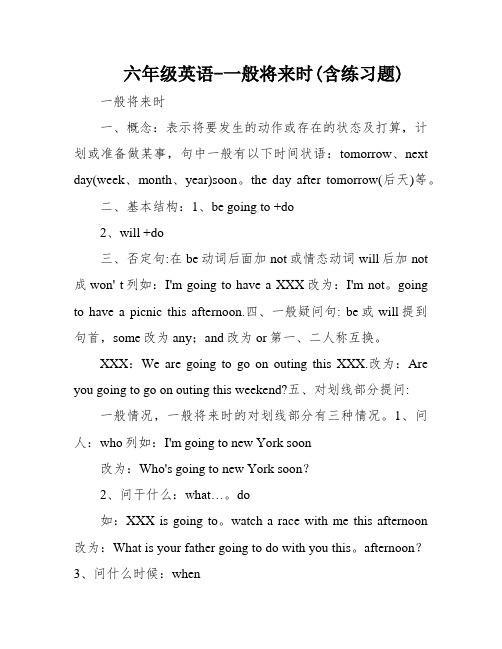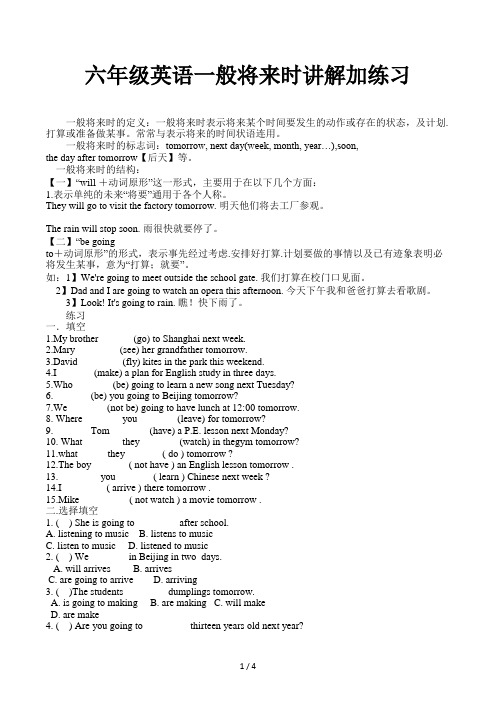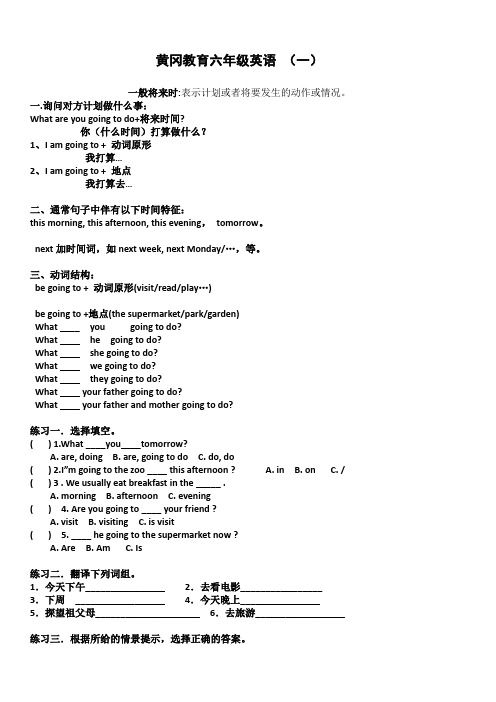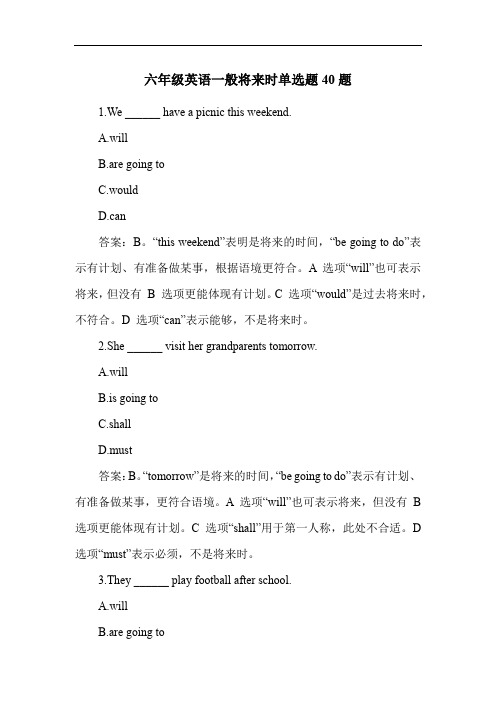六年级英语-一般将来时
六年级英语-一般将来时(含练习题)

六年级英语-一般将来时(含练习题)一般将来时一、概念:表示将要发生的动作或存在的状态及打算,计划或准备做某事,句中一般有以下时间状语:tomorrow、next day(week、month、year)soon。
the day after tomorrow(后天)等。
二、基本结构:1、be going to +do2、will +do三、否定句:在be动词后面加not或情态动词will后加not 成won' t列如:I'm going to have a XXX改为:I'm not。
going to have a picnic this afternoon.四、一般疑问句: be或will提到句首,some改为any;and改为or第一、二人称互换。
XXX:We are going to go on outing this XXX.改为:Are you going to go on outing this weekend?五、对划线部分提问: 一般情况,一般将来时的对划线部分有三种情况。
1、问人:who列如:I'm going to new York soon改为:Who's going to new York soon?2、问干什么:what…。
do如:XXX is going to。
watch a race with me this afternoon 改为:What is your father going to do with you this。
afternoon?3、问什么时候:when列如:She's going to go to bed at nine 改为:When is going to bed?六、同义句:。
六年级英语一般将来时讲解加练习

六年级英语一般将来时讲解加练习一般将来时的定义:一般将来时表示将来某个时间要发生的动作或存在的状态,及计划.打算或准备做某事。
常常与表示将来的时间状语连用。
一般将来时的标志词:tomorrow, next day(week, month, year…),soon,the day after tomorrow【后天】等。
一般将来时的结构:【一】“will +动词原形”这一形式,主要用于在以下几个方面:1.表示单纯的未来“将要”通用于各个人称。
They will go to visit the factory tomorrow. 明天他们将去工厂参观。
The rain will stop soon. 雨很快就要停了。
【二】“be goingto+动词原形”的形式,表示事先经过考虑.安排好打算.计划要做的事情以及已有迹象表明必将发生某事,意为“打算;就要”。
如:1】We're going to meet outside the school gate. 我们打算在校门口见面。
2】Dad and I are going to watch an opera this afternoon. 今天下午我和爸爸打算去看歌剧。
3】Look! It's going to rain. 瞧!快下雨了。
练习一.填空1.My brother ______ (go) to Shanghai next week.2.Mary ________ (see) her grandfather tomorrow.3.David ________ (fly) kites in the park this weekend.4.I_______ (make) a plan for English study in three days.5.Who _______ (be) going to learn a new song next Tuesday?6._______ (be) you going to Beijing tomorrow?7.We _______ (not be) going to have lunch at 12:00 tomorrow.8. Where _______ you _______ (leave) for tomorrow?9._______ Tom _______ (have) a P.E. lesson next Monday?10. What _______ they _______ (watch) in thegym tomorrow?11.what _____ they _______( do ) tomorrow ?12.The boy _______( not have ) an English lesson tomorrow .13.________ you _______( learn ) Chinese next week ?14.I ________ ( arrive ) there tomorrow .15.Mike _________ ( not watch ) a movie tomorrow .二.选择填空1. ( ) She is going to ________ after school.A. listening to musicB. listens to musicC. listen to musicD. listened to music2. ( ) We _______ in Beijing in two days.A. will arrivesB. arrivesC. are going to arriveD. arriving3. ( )The students ________ dumplings tomorrow.A. is going to makingB. are makingC. will makeD. are make4. ( ) Are you going to_________ thirteen years old next year?A. will beB. areC. beD. go5. ( ) ___will see a play in 5 days?A. WhenB. WhatC. WhoD. Whose6. ( ) Mary______ English next year.A. will learnB. will to learnC. are going to learn.D. learns7. ( ) He’ll _____ shopping this afternoon.A. goingB. goC. goesD. went8. ( ) Will you ____ at the bus stop at 10:30?A. meetingB. meetsC. meetD. met9. ( ) Lily and I _______ the guitar. next week.A. am going to playB. are going to playC. will playsD. play10. ( ) How ______ Jenny ___ home tomorrow?A. does......goB. is……goingC. will……goD. do……g o11. ( ) Who is going to _________ a song ?A. sings B singing C. to sing D. sing12. ( ) I _________in Beijing in three days.A. are going to arriveB. arriveC. will arriveD. arrives13. ( ) He _______some model planes tomorrow .A. going to makeB. is makingC. will make D makes14. ( ) Are you going to ___________a doctor next year ?A. will beB.. areC. beD. are going to15. ( ) She ________ you make supper this evening .A. helpsB. will helpC. is helpingD. is going help三.把下列句子变成一般疑问句,并给出肯定和否定回答。
六年级英语下册知识讲义-一般将来时以及情态动词can-人教版(五四学制)

一、学习目标1. 能够基本把握一般将来时的相关构成及用法。
2. 基本上能够理解情态动词can的两大用法。
二、重点、难点1. 一般将来时be going to 和will 之间的区别和联系。
2. 情态动词can在不同语境中的含义分析。
三、考情分析这两点在中考试题中都是非常重要的知识点,可以说每年都有所考查。
单选题、完成句子题都有它们的身影,而且在阅读和完形题中也会存在。
1. 一般将来时的概念及相关用法【教材原句】What are you going to do at the weekend? 你周末打算做什么?【概念】be going to do表示自己打算做某事、计划做某事或有意做某事。
【结构】主语+ be going to + do在变句练习中我们应该注意这里面存在的是be动词的变化。
根据“情助be实”四步变句法,应该在be动词上面进行变化。
We are going to have a picnic.We are not going to have a picnic.Are we going to have a picnic?Yes, we are. /No, we aren’t.当然,如果我们到了初二,学习了不定式的用法,此种结构实际上可以理解为be going 加上一个动词不定式结构。
【用法1】表示主体现在打算在最近或将来要做的某事。
这种打算往往是事先就已经考虑好了的。
【例句】My sister is going to learn German next month.我妹妹下个月起要学习德语。
My friend is going to stay for a week.我的朋友准备待一个星期。
【用法2】表示说话人根据已经有了的迹象来推断某件事情极有可能发生。
【例句】Look at the black clouds! It’s going to rain!看那些乌云,要下雨了。
【拓展】大家应该注意到的是,be going to也可以用来讨论自己对于未来状态的一种计划。
人教版六年级英语上册知识点归纳 Unit3一般将来时的表达方法

一般将来时的五种表达方法一般将来时1)am/is/are/going to + do和will/shall + doshall用于第三人称单数,常被will 所代替,二者都可以缩写成'll。
will 在陈述句中用于各人称,在征求意见时常用于第二人称。
Which paragraph shall I read first.Will you be at home at seven this evening?2) be going to +动词原形或地点,表示将来。
a. 主语的意图,即将做某事。
What are you going to do tomorrow?b. 计划,安排要发生的事。
The play is going to be produced next month。
c. 有迹象要发生的事。
Look at the dark clouds, there is going to be a storm.3) be +不定式表将来,按计划或正式安排将发生的事。
We are to discuss the report next Saturday.4) be about to +不定式,意为马上做某事。
He is about to leave for Beijing.注意:be about to 不能与tomorrow, next week 等表示明确将来时的时间状语连用。
一般将来时1.一般将来时的基本概念一般将来时表示将来某一时刻的动作或状态,或将来某一段时间内经常的动作或状态。
一般将来时由助动词shall(第一人称),will(第二、三人称)+动词原形构成。
美国英语则不管什么人称,一律用will。
2.一般将来时的形式●will 常简略为'll,并与主语连写在一起,如:I'll,he'll,it'll,we'll,you'll,they'll。
一般将来时(课件)人教PEP版英语六年级下册

时间状语
tomorrow 系列: tomorrow morning tomorrow afternoon tomorrow evening the day after tomorrow at 7:00 tomorrow morning
next 系列:
next time
next day
next week
A. are going B. are going to C. is going to
( C )3. We are going to cook some fish _____.
A. yesterday
B. last night
C. next weekend
( A )4. _____ you _____ TV every day?
A. Do; watch
B. Are; watching
C. Did; watch
( B )5. He _____ films tomorrow evening.
A. is watching B. is going to watch
C. watched
( C )6. Look!The girls _____ on the bridge over there.
一、一般将来时的用法 一般将来时表示将来某一时刻的动作或状态,或将来某一段 时间内要发生的动作或事情。 时间标志词:this afternoon, this evening, tomorrow, tomorrow+ 时间, the day after tomorrow, next+time/day/week/year … 等。 如: It is going to rain tomorrow. 明天将会下雨。
六年级英语一般将来时的语法总结及练习

黄冈教育六年级英语(一)一般将来时:表示计划或者将要发生的动作或情况。
一.询问对方计划做什么事:What are you going to do+将来时间?你(什么时间)打算做什么?1、I am going to + 动词原形我打算…2、I am going to + 地点我打算去…二、通常句子中伴有以下时间特征:this morning, this afternoon, this evening,tomorrow。
next加时间词,如next week, next Monday/…,等。
三、动词结构:be going to + 动词原形(visit/read/play…)be going to +地点(the supermarket/park/garden)What ____ you going to do?What ____ he going to do?What ____ she going to do?What ____ we going to do?What ____ they going to do?What ____ your father going to do?What ____ your father and mother going to do?练习一.选择填空。
( ) 1.What ____you____tomorrow?A. are, doingB. are, going to doC. do, do( ) 2.I”m going to the zoo ____ this afternoon ? A. in B. on C. / ( ) 3 . We usually eat breakfast in the _____ .A. morningB. afternoonC. evening( ) 4. Are you going to ____ your friend ?A. visitB. visitingC. is visit( ) 5. ____ he going to the supermarket now ?A. AreB. AmC. Is练习二.翻译下列词组。
六年级英语一般将来时单选题40题

六年级英语一般将来时单选题40题1.We ______ have a picnic this weekend.A.willB.are going toC.wouldD.can答案:B。
“this weekend”表明是将来的时间,“be going to do”表示有计划、有准备做某事,根据语境更符合。
A 选项“will”也可表示将来,但没有B 选项更能体现有计划。
C 选项“would”是过去将来时,不符合。
D 选项“can”表示能够,不是将来时。
2.She ______ visit her grandparents tomorrow.A.willB.is going toC.shallD.must答案:B。
“tomorrow”是将来的时间,“be going to do”表示有计划、有准备做某事,更符合语境。
A 选项“will”也可表示将来,但没有B 选项更能体现有计划。
C 选项“shall”用于第一人称,此处不合适。
D 选项“must”表示必须,不是将来时。
3.They ______ play football after school.A.willB.are going toC.mayD.should答案:B。
“after school”表示将来的时间,“be going to do”表示有计划、有准备做某事,更符合语境。
A 选项“will”也可表示将来,但没有B 选项更能体现有计划。
C 选项“may”表示可能,不是将来时。
D 选项“should”表示应该,不是将来时。
4.I ______ buy a new book next week.A.willB.am going toC.canD.might答案:B。
“next week”表示将来的时间,“be going to do”表示有计划、有准备做某事,更符合语境。
A 选项“will”也可表示将来,但没有B 选项更能体现有计划。
C 选项“can”表示能够,不是将来时。
一般将来时讲解及练习六年级

一般将来时标志词:tomorrow,thedayaftertomorrow,nextweek,intwoyears,soon,threedayslater等结构一:willwill可用于所有人称,shall只用于第一人称I和we肯定形式:主+willdo一般疑问:will+主+do否定形式:主+won’tdo特殊疑问:what/when/where/which+will+主+doeg:1.we knowtheresultsoon.我们很快就会知道结果了;2.we knowtheresultsoon.我们不会很快就知道结果的;3. we knowtheresultsoon.我们将会很快就知道结果吗4. weknowtheresult.我们将在什么时候知道结果结构二:begoingto肯定形式:主+begoingto+do一般疑问:be+主+goingto+do否定形式:主+benotgoingto+do特殊疑问:what/when等+be+主+goingto+doeg:skyisfullofblackclouds.Itto .快要下雨了;2.ButIthinkit rain.但我觉得它不会下雨;3.it soon很快就会下雨了吗4. you to tomorrow明天你要干什么小小区别:通常情况下will和begoingto能互换will,shall多习惯用于表示是否愿意,第一人称作主语的疑问句一般用shall不用willbegoingto则多用于表示根据迹象判断将要发生某事,或者计划打算要做的事eg:1.youdrivetoschooltomorrowwemeetat8:00tomorrowattheblackcloudsIt rain.readsomebookinthelibrarythisafternoon.用现在进行时bedoing表示将来时:go,come,leave,arrive等表示位置转移的动词eg:1.UncleWang come.王叔叔就要来了;2.They leaveforBeijing.他们即将前往北京;一般将来时练习一.连词成句并按要求改变句式注意动词的正确形式1、children,at,study,home,will,on,computer,inthefuture肯定陈述句:一般疑问句:2、back,they,month,later,a,get,will肯定陈述句:否定句:一般疑问句:3、he,is,going,a,to,patty,evening,this肯定陈述句:否定句:一般疑问句:特殊疑问句问时间:4. China is a modern and strong country.in twenty years5. Do you study hardfrom now on二、用括号中词的适当形式填空1、Thebus come.Pleasewaitforaminute.2、Guangzhou 将会morebueatifulYes,3、Howyou spentyouwinterholiday4、Peoplehavelessworktodointhefuture.5、we goouttomorrowifit rain三、选择正确的答案1. Thereanimportantmeetingnextweek.A.willbeB.willhaveC.willhasD.willgoingtobe2. toEnglandtomorrow.A.flyB.flewC.isflyingD.flies3. Marywillcomebackfiveo’ter4. yougototheparktomorrowA.WillB.ShallC.DoD.Are5. . The day after tomorrow they ________ a volleyball match.A. will watchingB. watchesC. is watchingD. is going to watch6. .There ________ a birthday party this Sunday.A. shall beB. will beC. shall going to beD. will going to be7. They ________ an English evening next Sunday.A. are havingB. are going to haveC. will havingD. is going to have8. ________ you ________ free next Sunday A. Will; areB. Will; be C. Do; be D. Are; be9. He ________ there at ten tomorrow morning. A. willB. Is C. will beD. be10. ________ your brother ________ a magazine from the libraryA. Are; going to borrowB. Is; going to borrowC. Will; borrowsD. Are; going to borrows作业:一、单项选择;1. There __________ a meeting tomorrow afternoon.A. will be going toB. will going to beC. is going to beD. will go to be2. Charlie ________ here next month.A. isn’t workingB. doesn’t workingC. isn’t going to workingD. won’t work3. He ________ very busy this week, he ________ free next week.A. will be; isB. is; isC. will be; will beD. is; will be4. There ________ a dolphin show in the zoo tomorrow evening.A. wasB. is going to haveC. will haveD. is going to be5.–________ you ________ free tomorrow – No. I ________ free the day after tomorrow.A. Are; going to; willB. Are; going to be; willC. Are; going to; will beD. Are; going to be; will be6. Mother ________ me a nice present on my next birthday.A. will givesB. will giveC. givesD. give7. – Shall I buy a cup of tea for you–________. 不,不要;A. No, you won’t.B. No, you aren’. No, please don’t.D. No, please.8. – Where is the morning paper – I ________ if for you at once.A. getB. am gettingC. to getD. will get二、动词填空;1. I ______leavein a minute. I ______finishall my work before I ______ leave.2. —How long _____ you _____studyin our country—I _____planto be here for about one more year.—What ______ you ______doafter you ______leavehere—I ______returnhome and ______geta job.3. I ______betired. I ______goto bed early tonight.4. Mary’s birthday is next Monday, her mother _____giveher a present.三、句型转换;1. People in the north often go skating in winter. next winter2. There are two cinemas in that town. next year3. He comes back late.in two days4.She is a conductor of a train.soon。
- 1、下载文档前请自行甄别文档内容的完整性,平台不提供额外的编辑、内容补充、找答案等附加服务。
- 2、"仅部分预览"的文档,不可在线预览部分如存在完整性等问题,可反馈申请退款(可完整预览的文档不适用该条件!)。
- 3、如文档侵犯您的权益,请联系客服反馈,我们会尽快为您处理(人工客服工作时间:9:00-18:30)。
一般将来时
一、概念:表示将要发生的动作或存在的状态及打算,计划或准备做某事,句中一般有以下时间状语:tomorrow 、next day(week 、month、year)soon the day after tomorrow(后天)等。
二、基本结构:1、be going to +do
2、will +do
三、否定句:在be动词后面加not或情态动词will后加not成won' t
列如:I'm going to have a picnic this afternoon
改为:I'm not going to have a picnic this afternoon.
四、一般疑问句: be或will提到句首,some改为any;and改为or第一、二人称互换。
列如:We are going to go on outing this weekend.
改为:Are you going to go on outing this weekend
五、对划线部分提问:
一般情况,一般将来时的对划线部分有三种情况。
1、问人:who
列如:I'm going to new York soon
改为:Who's going to new York soon
2、问干什么:what…..do
如:My father is going to watch a race with me this afternoon 改为:What is your father going to do with you this afternoon
3、问什么时候:when
列如:She's going to go to bed at nine
改为:When is going to bed
六、同义句:
be going to =will do(动词原形)
一般将来时练习题
1、我打算明天和朋友去野餐. I______ ______ ______have a picnic with my friends I __ __have a picnic with my friends
2、你妈妈这个周末去购物吗是,她要去买些水果。
_____your mother _______ _______go shopping this __ ___
Yes. She ____ _____ _____ buy some fruit.
3、你们打算什么时候见面。
What time ______ you ____ _____meet.
4、Nancy is going to go camping. (改为否定)
Nancy _______going to go camping
5、I'm going to get up at 6:30 tomorrow (改为一般疑问句)
_____ _____ ______ to get up at 6:30 tomorrow
6、I ' ll go and join them . (改为否定)
I _______ go _______ join them .
7、We will meet at the bus stop at 10:30 . (改为一般疑问句)
______ ______ meet at the bus stop at 10:30 .
8、She is going to music after school (对划线部分提问)
______ _____she_____ _____ _____after school
9、My father and mother are going to see a play the day after tomorrow.(对划线部分提问)
______ ______ going to see a play the day after。
